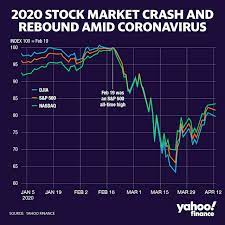What to do when the stock market is crashing
- Posted on February 22, 2022
- Editors Pick
- By Glory

First things first. DO
NOT PANIC!
When stocks are falling
and the value of people's portfolios is plummeting, panic selling is a common
reaction. As a result, it's critical to understand your risk tolerance and how
price fluctuations—or volatility—may affect you ahead of time. Hedging your portfolio
through diversification—holding a variety of investments, including some that
have a low degree of connection with the stock market—is another way to reduce
market risk.
It is understandable to think
whether or not it is the best choice to pull your money out of the stock market
amid a current crash, and the value of your portfolio plummets. It may seem
like the reasonable thing to do but probably not the best option.
The most recent stock
market crisis occurred in early 2020, with the emergence of the COVID-19
pandemic which remains a major source of market volatility. However, the
current market crash is beyond the pandemic. Market downturns are common and
can be triggered by a variety of circumstances. In early 2022, markets were
down not only due to pandemic fears, but also due to concerns about rising
inflation and interest rates.
Based on the history of
the stock market we can tell how long crashes, corrections, and bear markets have
lasted, but there is no telling how long and severe future declines may turn
out. For example, the S&P 500 stock index fluctuates between -1%and 1%,
anything outside of these parameters may be deemed an active day on the stock
market. Trading may be paused for 15 minutes if the S&P 500 declines 7% in
a single day which has only happened a few times in the history of the market,
and it represents a bad day for Wall Street.
Long-term investors
understand that the market and economy will eventually revive, and they should
be prepared for it. The stock market fell during the 2008 financial crisis, and
many investors lost their assets. The market, on the other hand, bottomed out
in March 2009 and finally rebounded to its previous highs and beyond. Panic
sellers may have missed out on the market's surge, but long-term investors who
stayed in the market rebounded and did better over time.

So, here are 4 ways you can
survive a market crash:
1.
Know your risk tolerance: Your
risk tolerance is determined by a variety of factors, including your investment
time horizon, monetary needs, and emotional reaction to losses. It is important
to thoroughly research the stock market and have a record of the strengths,
flaws, and purpose of each investment in your portfolio. Your findings will
serve as a concrete reminder of the characteristics that make a stock
worthwhile to hold. A rapid fall in the value of an investor's portfolio is
disturbing to say the least for inexperienced investors. That is why it is
critical to determine your risk tolerance before you begin building your
portfolio, rather than when the market is in the midst of a sell-off.
2.
Diversify your portfolio: Diversification,
or spreading your money over a variety of investments, is critical for lowering
investment risk and surfing safely through a volatile market. Diversifying your
investments ensures that they aren't all invested in one place. As a result, if
one stock or industry has a bad day, your other assets may be able to
compensate for the losses. Downside risk can be mitigated to a degree by
diversifying your portfolio and employing other investments like real estate,
which have a low correlation to equities. Diversification is defined as
allocating a portion of your portfolio to stocks, bonds, cash, and alternative
assets. Every investor's situation is unique, and how you divide your portfolio
is determined by factors such as risk tolerance, time horizon, and goals. You
may avoid the risks of putting all your eggs in one basket if you use a
well-thought-out asset allocation strategy.
3.
Prepare for possible losses: You
must understand how the stock market operates in order to invest with clarity.
This helps you to study unanticipated downturns and decide if you should sell
or buy more stocks. Mostly, be prepared for the worst-case scenario and have a working
strategy in place to mitigate your losses. If the market crashes, investing in
only equities could result in a large loss of capital. Investors intentionally
make other investments to diversify their portfolio and reduce risk in order to
hedge against losses.
4.
Focus on the long-term: Despite
the fact that stock market returns can be extremely unpredictable in the short
term, they beat practically every other asset class in the long run. Even the
biggest declines appear to be minor glitches in the market's long-term upward
trend when seen over a suitably extended period of time. This is especially
important to remember amid volatile periods when the market is on the downturn.
Having a long-term perspective will help you to see a major market crash as an
opportunity to build wealth, rather than a threat to clean out your investment.
Usually, in major bear markets, investors sell stocks regardless of quality,
creating an opportunity to buy certain blue chips at reasonable prices and
valuations.
Why should I invest?
Investing helps you
protect your retirement, make the most of your money, and expand your wealth
through the power of compounding. According to a Gallup poll conducted in July
2021, 44 percent of Americans do not invest in the stock market due to a lack
of confidence in the market as a result of the 2008 financial crisis and the
recent market volatility. Also, those who don't have enough funds to get by
month to month don't have money to invest in the stock market.
According to Gallup, from
2001 to 2008, an average of 62 percent of U.S. adults indicated they owned
stock, a number that has never been surpassed since. A stock market drop,
whether caused by a recession or an exogenous event like as the COVID-19
pandemic, can put basic investing principles to the test. It's crucial to
remember that the stock market is cyclical, and that stocks will inevitably
fall in value. However, a dip is only brief. Instead of panic selling when
stock prices are at all-time lows, it's better to look long-term.


Be the first to comment!
You must login to comment